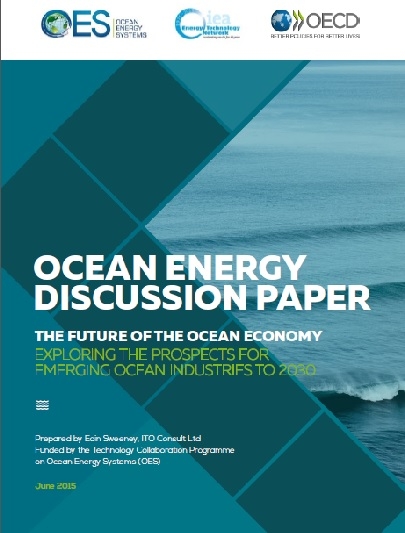


The Ocean Energy Discussion Paper is a contribution from the OES to the OECD Study on the Future of the Ocean Economy
Background and rationale
The ocean and its resources are increasingly seen as indispensable in addressing the multiple challenges the planet is facing in the decades to come. By mid-century enough food, jobs, energy, raw materials and economic growth will be required to sustain a population of 9-10 billion people. The potential of the ocean to help meet those requirements is huge.
The report recently published by the OECD (http://www.oecd.org/futures/oceaneconomy.htm) address the future evolution of established and emerging ocean-based industries and activities. Broadly speaking, established ocean activities encompass shipping, shipbuilding and marine equipment, capture fisheries and fish processing, traditional maritime and coastal tourism, conventional offshore oil and gas exploration and production, dredging, and port facilities and handling. Emerging ocean-based industries and activities may include:
• Off-shore wind, tidal and wave energy;
• Offshore extraction of oil and gas in deep-sea and other extreme locations;
• Sea-bed mining for metals and minerals;
• Marine aquaculture;
• Marine biotechnology;
• Ocean-related tourism and leisure activities (especially the cruise industry);
• Ocean monitoring, control and surveillance;
• and fledgling or, as yet, “unborn” industries.
The landscape of traditional maritime industries will be undergoing significant change in the coming decades. This is partly driven by global economic growth and increasing demand. In the shipping sector, for example, container traffic looks set to continue to grow very fast, with volumes tripling by 2030. Fisheries production worldwide is expected to expand by around a fifth over the next ten years, although the main driver of overall production will be aquaculture (OECD-FAO, 2015). Even if in recent years improvements have been made, there is little or no room for further expansion in wild fish catch in the absence of strict management plans to rebuild stock abundance to biologically sustainable productivity levels. And in tourism, ageing populations, rising incomes and relatively low transport costs will make coastal and ocean locations ever more attractive. Concurrently, developments in traditional maritime industries will also be shaped by climate change, as shifts in temperature, ocean acidity and rising sea levels affect movements of fish stocks, open up new trading routes, affect sea port structures, and create new tourist destinations and attractions, whilst destroying others.
Emerging ocean-based industries offer huge opportunities for addressing many of the big economic, social and environmental challenges facing humankind in the years ahead. These emerging ocean industries are developing and applying a range of science and technology innovations to exploit the ocean’s resources more safely and sustainably, or to make the oceans cleaner and safer and to protect the richness of their resources. The activities differ considerably in their stage of development: some are relatively advanced while others are still in their infancy. To bring them on stream on a scale that would allow them to contribute in a meaningful way to global prosperity, human development, natural resource management and green growth will require considerable R&D effort, investment, and coherent policy support.
Such efforts however need to be shaped and directed with a view to the future, which is why this project has its sights set on 2030 and beyond.